3 Easy Ways to Connect with Your Baby at Mealtimes with Anna Lutz, MPH, RD, LDN, CEDRD-S
In this episode we're talking about:
- Why YOU as the caregiver need to identify what you need to make a successful meal
- How to physically and safely support YOUR BABY at mealtime
- What a “competent” eater is and why the amount of food your baby eats doesn't matter
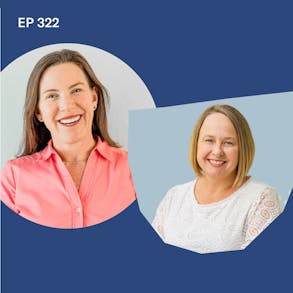
LISTEN TO THIS EPISODE
Episode Description
By the time you get food on the table, is connecting with your baby top of mind? Mealtimes can be mayhem, and it’s easy to get distracted or disconnected from what our babies are experiencing when they are learning to eat. In this episode I’m interviewing Anna Lutz, MPH, RD, LDN, CEDRD-S about some easy ways to stay connected with your baby at mealtimes…and why the total amount of food your baby is or isn’t eating doesn’t really matter!
About the Guest
- Anna Lutz is a Registered Dietitian specializing in eating disorders and family and pediatric nutrition
- She is a mom of 3 and the co-host of the Sunny Side Up Nutrition podcast

- Anna runs a private practice in Raleigh, NC and teaches about connection at mealtimes

Links from this Episode
- Anna is the co-host of the Sunny Side Up podcast which you can find at: https://sunnysideupnutrition.com/
- Her Family and Pediatric Nutrition practice is online at: https://lutzandalexander.com/
- Baby-Led Weaning with Katie Ferraro program with the 100 First Foods™ Daily Meal Plan, join here: https://babyledweaning.co/program
- Baby-Led Weaning for Beginners free online workshop with 100 First Foods™ list to all attendees, register here: https://babyledweaning.co/baby-led-weaning-for-beginners

Latest Episodes
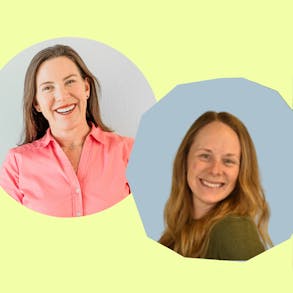
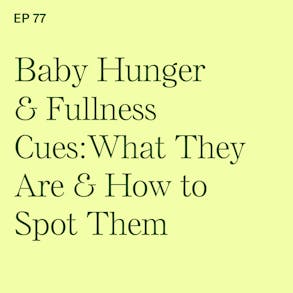
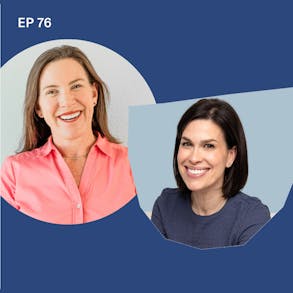
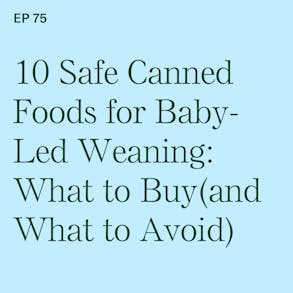
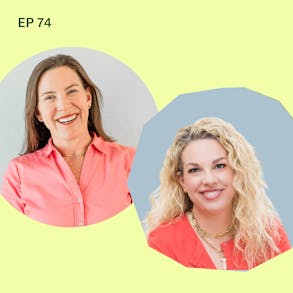
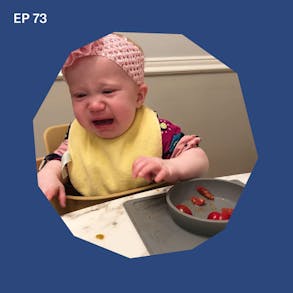
0 (1s):
If you're feeling a little stressed or anxious or bummed about your mom life right now, I wanna tell you guys about a podcast I've been listening to called Meditation for Women, hosted by Katie from the Women's Meditation Network. Whether you wanna start your day with mindful attention, relief, stress or anxiety, or just fall asleep easier, Katie's meditations are so on point and this is coming from another Katie who's not normally a meditation sort of person. Katie k from Women's Meditation Network is a busy mom too, so I feel like her meditations are totally geared to my level in life right now. Earlier today I listened to the episode called In My Cave Guided Meditation because basically I feel like I work in a cave in front of my computer all day and her quick meditation helped me get my head and my heart set for the day.
0 (46s):
Check out Meditation for Women podcast and you can find all of Katie's other shows she's online at women's meditation network.com or search meditation for women wherever you listen to podcasts.
1 (58s):
The connection is, is important that our nervous systems communicate that feeding is not only about getting food in, but it's about exploring. I really encourage the parents to be eating what the child's eating, which I'm sure you do too, really reminding yourself the ultimate goal is not to get food in the child's mouth. It may be just the exploring, maybe seeing mom or dad or caregiver eating that same food. It may be just the smells, it may be the squishing.
0 (1m 26s):
Hey there, I'm Katie Ferraro, registered dietician, college nutrition professor and mom of seven specializing in baby-led weaning here on the baby-led Weaning Made Easy podcast. I help you strip out all of the noise and nonsense about feeding, leaving you with the confidence and knowledge you need to give your baby a safe start to solid foods using baby-led weaning. When you sit down to a meal with your baby, are you exhausted or invigorated? I would say most of us are pretty tired and I'm sorry, but if I got around to getting a good meal on the table, like the idea of connecting with my baby, it's not always top of mind.
0 (2m 11s):
I got other kids who are screaming, they want my attention. There's laundry and work and so many distractions. My guest today is Anna Lutz and she gets us, Anna is a registered dietician who specializes in eating disorders and family and pediatric nutrition. And one area that she's really kind of honed in on is this whole arena or idea of family connection at mealtimes. And I think you're really going to like Anna's message because in this era of parenting where everyone is stressed out about their baby schedule or you're anxious about milestones, Anna really teaches us how to take a step back and zoom out to see what matters as far as our rules in the feeding relationship go.
0 (2m 54s):
I'm a huge fan of Anna's podcast. It's called Sunny Side Up Nutrition, a great listen if you're looking, looking for another podcast to follow. And I was really excited to have this conversation with her about some easy activities that we all can do as far as connecting with our baby at Mealtimes goes. So with no further ado, here's Anna.
1 (3m 16s):
Thank you so much for having me. I'm so excited to be here.
0 (3m 19s):
Now before we get started, could you tell us just a little bit about the work you do and how you help families?
1 (3m 24s):
Absolutely. I'm a registered dietician. I'm in Raleigh, North Carolina and I have a private practice here, a group private practice where we work with individuals with eating disorders and we also work with families around when their children have any kind of feeding concerns. But also I'm the co-creator of Sunnyside Up Nutrition, which is a blog and podcast where we support families in raising children in a diet free way, really getting the noise of diets and restrictive eating out and relat helping parents raise their children to have healthy relationships with their food and body.
0 (4m 1s):
So I'm a fan of your podcast Sunnyside Up Nutrition, and I've always been curious what's the origin story behind the name of the podcast and the brand?
1 (4m 7s):
Oh, I love that you asked that. So Elizabeth Davenport is the other dietician who I create sunnyside up nutrition with. We met in graduate school and when we were trying to come up with a name, I mean we spent hours going back and forth of all these names and honestly we came across Sunny. We kind of landed on Sunnyside up Nutrition for a few reasons that it's, it gives a positive message. At the time I had backyard chickens and my children loved collecting the eggs and also this was my father's favorite way to cook eggs was sunny side up. And so it really reminds me of my father.
0 (4m 48s):
I love that and I love just the positive spin. That's like the thing I noticed from like when I first started following you, and I'm a dietician as well and sometimes, you know, we kind of get a bad rap is being the food police and telling people what not to eat. And one thing we really focus on in our content in my business is really helping parents to recognize all of the foods that their babies can eat. So I'm very much on board with all of your positive vibes and I personally love Sunnyside of Eggs, so I love that story. And Anna, I really enjoyed your recent episode on your podcast about the new AAP guidelines, and I think you interviewed Dr. Katcha Roel, who's been on our podcast talking about severe picky eating. And on your podcast and in your content, you guys cover a lot of topics related to diet culture and weight stigma.
0 (5m 29s):
And I think our podcast actually launched pretty much around the same time, like at the beginning of the pandemic. I'm just curious like what your experience was, why you guys decided to go podcasts, and then how has your experience as podcasters been?
1 (5m 40s):
Yeah, well it was not in our plans at all. Elizabeth who is, she's located in the Washington DC area, she had an intern who was going to do a series of parent workshops as part of her internship. So her name is Anna mackay, she's a soon-to-be dietician. And suddenly as happened everywhere, everything was shut down and she wasn't able to do these parent workshops in the DC area. And so for her project, she interviewed Elizabeth and myself, she did a five-part series on raising confident Eaters. And that was the start of our podcast. We didn't wanna stop, we just kept going and here we are, you know, several years later continuing.
1 (6m 25s):
And so sometimes I'm the host with Elizabeth and sometimes Elizabeth hosts it with Anna mackay or Anna mackay hosted. So it's, it's been wonderful.
0 (6m 33s):
And that's a perfect segue into my next question, this idea of raising competent eaters. I was familiar with your mini-series on the topic and I'm just curious what that term competent eater means to you as a practitioner?
1 (6m 45s):
It means that a child can go out into the world and feed themselves in a way that's nourishing and and is not anxiety producing or, or just stressing. And so I really think about this when I'm helping parents that your child doesn't need to eat in a certain way today. You know, let's zoom out and think, okay, when my child is ready to go out into the world, maybe go to college and go through the cafeteria line or, or go over to friends' houses when they're teenagers, are they gonna be able to feed themselves in a way that, you know, supports their physical body but also their mental health
0 (7m 20s):
And language being so important. When I hear the term competent eater, what I hear are all the terms that you don't use. And so I'm just curious, maybe you could share like why you don't say a healthy eater or other words and I'm, I don't wanna put words in your mouth, but I know a lot of dieticians, we don't, we don't use that word anymore. And your thoughts on words that you're not using when you choose competent in place.
1 (7m 39s):
Yeah, I mean I think unfortunately healthy now has this negative connotation. I, it shouldn't, you know, I want my child to be a healthy eater, but I think of it in a more holistic way. But I think now people hear that word and interpret it in certain ways, you know, maybe that they, that might mean not eating, eating certain foods, you know, or only eating these other foods. And so I think it could have this restrictive element. So I, I don't love that word healthy and I think that nutrition is so much more than what we eat. It's not just what goes in our mouth, it's also our relationship with food. It's the memories that we form when we're eating with our families.
1 (8m 20s):
You know, going back to my memory about setting side up eggs, you know, there's that, those memories that are so inherent to our food and so that's why we try to use this, this kind of bigger term than just healthy.
0 (8m 32s):
And it's funny cuz for a lot of people the term healthy is probably totally innocuous. It depends what field you're in, where you're coming from, you're coming from an eating disorder background. So there's a lot of weight around the word healthy. If you could see like the strike through list of words we no longer use in the baby-led weaning space, like we used to say an eager eater and then that just conjures up image of like parents like, oh my gosh, children over stuffing and that's panicky and my child's gonna choke. And then we talked about being an adventurous eater, but I mean there's really no right words are constantly evolving. So I appreciate your insight there and I love what you said that nutrition is about so much more than what we eat. And as a dietician, I know personally and a mom, it's sometimes hard to disconnect yourself from that. We have so many dietician moms in our community who they say, I really appreciate that message cuz I'm stressed out about how much my baby is eating.
0 (9m 16s):
And we say exactly the same thing as you zoom out and let's look at the bigger picture here. Your baby needs a lot of time in practice to learn how to eat. And so when we're hearing messages and we cover a lot of misinformation in the infant feeding space, but things like, you know, doctors still saying things like you need to start solid foods early to promote ketchup growth for premier small babies. And we say, you know, that is first of all, physiologically impossible for your child to use food, a thing that they don't know how to eat yet to do something like gain weight, which you should be working with a pediatric dietician and you should be fortifying the the infant milk supply. Like a lot of parents have a lot of kind of, I would say stress and anxiety around how much their children are eating. But we have to back up and give them space to even learn how to eat if we want them to achieve this competence, which I love what you said, like think about college, like it's scary to think about college when you have a baby, but I want them to be able to cruise through the cafeteria line or go over to friend's house and not have this fraught relationship with food that, you know, so many of our parents will readily admit, I don't have the best relationship with food and I don't wanna project that onto my child.
1 (10m 17s):
Right, right, right. I I just think that's also true and the work you do is kinda is the beginning of of that journey. You know that it's a child gaining skills around this task, this developmental task of eating and that it starts when they're, when they're born and it then it just continues. And if we can think of it that way, I think it can be freeing for parents rather than, we've gotta figure it out right now.
0 (10m 42s):
Hey, we're gonna take a quick break but I'll be right back.
3 (10m 49s):
The all new Toyota Prius looks nothing like you've ever seen before. It's, you just gotta see it.
4 (10m 53s):
Yeah. Okay, this is going on the radio so you're gonna need to describe the all new Prius to people.
3 (10m 59s):
Oh, okay. Yeah, yeah, yeah.
4 (11m 5s):
Use your words please.
3 (11m 6s):
Oh, oh got it. Here we go. Wowsers. Ugh, I give up the all new Prius, it's indescribable now. Toyota, let's go places vehicle inventory may be limited. Check with your Toyota dealer.
0 (11m 23s):
And I liked what you said about, you know, your child does not need to eat in a certain way today because parents feel a lot of pressure like Katie. Oh my gosh. So you're saying like from their very first bites, we need to be doing all these different foods and you know, the intention with our whole hundred first foods approach, we encourage families to introduce their babies to a hundred different foods before they turn one. From a fun standpoint, from a variety standpoint, kind of a challenge. But if you can't get there or you're not doing it, it's not the end of the world. You, your child is evolving and they'll go through lots of different phases and have many different relationships with food. And so I appreciate this, this kind of 360 view cuz sometimes it's so easy to just get in your space of where you are. And our parents are listening aren't primarily parents of babies age six to 12 months, they're making that transition to solid foods which can be overwhelming and can be stressful.
0 (12m 6s):
And so in your experience, if you had to give one piece of advice to a new mom who is struggling with the transition, what would you say if they're stressed out about this move to solid foods for their baby?
1 (12m 16s):
The thing that comes to my mind is really making sure that your child is developmentally ready. You're seeing those cues and that you're not following someone else's timeline. I have three kids that are pretty spread out. I have a 16 year old, 13 year old and seven year old and so I was very different parent for each one of them. But you know, this message of a baby needs solid foods at a certain age or if you're comparing to cousins or that type of thing. But really to take a deep breath and think, is my child developmentally ready to move, move there cuz it's gonna go easier if they are,
0 (12m 49s):
I love that. And we always remind parents, you know your baby best, like you are the best mom or caregiver or grandparent for your baby. And I love this idea of not following someone else's timelines. And I think, you know, we always get requests, can you do more stuff on developmental milestones? And it's like, I think they're important to be aware of, but then parents tie themselves to it so much. And if your baby's not on the exact same timeline as another baby, you're, you have no other option except to feel like a failure. And that's, that's not what we want. And we do a lot of work on Instagram, constantly commenting, how old is that baby? How old is that baby eating beef? How old is that baby? And sometimes I share it because I want parents to know that babies can eat so many more foods than we may give them credit for. But I also, you have to give the backstory about them being developmentally ready about them showing the other reliable signs of readiness to eat.
0 (13m 35s):
And parents are getting a lot of pressure to start too early and we always say there's absolutely no upside to starting early. It's much more fun and certainly much safer to feed a baby who really is ready. And you teach a lot about connection and the importance of connection at family meal time. So you know, there's a family coming into your practice and you are gonna give some actionable activities or tips for how families can connect at mealtimes and if possible, specific to having a baby. Any thoughts there?
1 (14m 2s):
Yeah, well I, we talk a lot about nervous system regulation and how a caregiver and a child's nervous systems are co-regulating, right? They're communicating with each other. And so the first thing I really think about is how can the caregiver be grounded and not stressed out at a meal? Because if the caregiver is, is stressed out, your nervous system is communicating with your baby and then that's gonna interfere with the, with the baby eating. And so really thinking about as a caregiver, what do I need to feel supported at this meal? And it can be physically, you know, where am I gonna sit at the table? It could be, you know, what do I need to, to make the, the meal and have a moment by myself, the kind of ground myself?
1 (14m 49s):
What, what do I need to not, not feel stressed out? So that's kind of the first thing I think about. The second thing I think about is the baby being supported physically at the table. And so really thinking about the high chair, the support in the back, the support under the feet because again, that that nervous system, the baby feels grounded and not kind of floating, floating around. And so physically kind of thinking about that. And so once you've got those two things I think about first and then after that is to remember that the connection is, is important that our nervous systems communicate that feeding is just not, is not only about getting food in, but it's about exploring.
1 (15m 34s):
And so I really encourage the parents to be eating what the child's eating, which I'm sure you do too, really reminding yourself the ultimate goal is not to get food in the child's mouth. It may be just the exploring, maybe seeing mom or dad or caregiver eating that same food. It may be just the smells, it may be the squishing, but really, you know, making sure that you're connecting in these activities and looking each other in the eye, you know, really kind of, we communicate with our nervous system so much through our faces. So those are kind of the the first things that come to my mind.
0 (16m 8s):
I love the kind of tying in the nervous system and I, I think sometimes like saying don't be nervous is easier said than done. Like, it's like when people tell you when you're trying to get pregnant, like, oh, just relax and it'll happen. And you're like, I'm trying. And same thing, like we talk about this, you know, creating a peaceful feeding environment and especially if you have older kids, like it's not peaceful sometimes. And so what do you think about, parents ask this a lot, like if you have a toddler and you know, you always are feeling split between the kids, right? Or you have older kids and you're trying to focus and give attention to the baby, but then you know, the importance of eating together at mealtime. Is there ever a situation where, you know, having a meal just with the baby on the own, if I'm sorry, but my toddlers stress me out. Like, is that okay? Or do we always need to be eating every meal together?
1 (16m 49s):
No, I, I don't think there's any always, you know, I think figuring out for your family what, what works. You know, I'm a big proponent of family meals. I think they're important and if you feel like every time your baby's sitting down and it feels like a circus and you're stressed out and, and they, and you don't feel like they're, they're getting that connection with you, it's okay to carve out a time during your day that they're getting a meal or a snack just with you or just with one, one or two of your other children. I, I don't think it has to be a certain way and that's probably the biggest message is none of this has to be a certain way and that you can explore food together and it doesn't have to even be at a meal time.
1 (17m 29s):
You know that there can be that exploration of the, of you sitting there with food without any expectation of the child eating it.
0 (17m 38s):
Hey, we're gonna take a quick break, but I'll be right back.
5 (17m 46s):
Hello Friends. Bedtime can be a special time for parents and kids to Bond and the Sleep Tight Stories podcast can help make it even more magical. Every week we produce original stories that transport your child to worlds of imagination and wonder while helping them drift off to sleep with ease. Each story is just the right length and features characters and stories children love and can relate to. Plus, listening to stories before Bed has been shown to improve language skills and enhance creativity.
5 (18m 27s):
Check out sleep tight stories wherever you listen to podcasts and add a happily ever after to your bedtime routine. Thank you.
0 (18m 44s):
And I love what I'm hearing you say is there's really no rules to this and I think that's just the message we wanna enforce to parents is it is important that we're offering a variety of foods and doing so in a safe manner, but like parents are, how many times do I need to feed solid foods a day at this age? And it's like these rules are not written in stone and it's nice to hear another dietician with, I would say a much more lax approach. I feel like too often in our field, like everyone wants a framework and we have a feeding framework for helping parents achieve variety. So I, I'm one to talk, but like there aren't hard and fast rules. You don't have to do it this way. This is something that you might consider doing, it's worked from some of the other families, but I'd love to hear your experience about what's working for you. And so for families that come to your private practice, like what are, I know you guys do eating disorders, but do you see babies and then what are some of the reasons why a family might bring a baby to see you?
1 (19m 30s):
Yeah, we do see some babies or toddlers and you know, it might be a concern about introduc, you know, wanting support around introducing solids. It may be concern about slow weight gain that we're kind of putting our heads together of what might be going on. And then for a toddler or older child, it may be concerns around picky eating. And so yes, I agree with you that there some structure is important, right? That we do, we might help if the structure is kind of bringing down the anxiety in the family, that can be super helpful. But when, when the structure or rules is actually raising everyone's anxiety, that's when it can interfere with the feeding relationship.
1 (20m 12s):
And so we're kind of doing some detective work around that.
0 (20m 15s):
Well Anne, I love, I love all of your podcast episodes. I love the issues that you're tackling. I learned so much from you and your colleagues. Where can our audience go to learn more about your work?
1 (20m 24s):
Yes, you can find us@sunnysideupnutrition.com or on Instagram at sunnyside up nutritionists. And we're also on Facebook.
0 (20m 35s):
Thank you so much, Anna.
1 (20m 36s):
Thank you.
0 (20m 38s):
Well, I hope you guys enjoyed that interview with registered dietician Anna Lutz, to summarize her three pillars for establishing connection at mealtimes with your baby. First and foremost, you the caregiver, you're the most important one. Ask yourself, what do you need in order to not feel stressed out at this mealtime? Secondly, is your baby being supported? And we're talking about physical support. We teach a lot on the podcast about safe highchair positioning and the importance of a solid foot plate. And all these things are part of our job as a parent in the feeding relationship is making sure the baby is physically supported. And then thirdly, Anna was talking about the importance of not over focusing on how much your baby is eating, right?
0 (21m 18s):
It is not important how much your baby is eating at this stage. Your baby needs lots of time and support to learn how to eat. So we kind of need to zoom out and look at the bigger picture here, which is our ultimate goal is to help raise, as Anna says, a competent eater. And that's a term that we use in the nutrition and feeding space. And I, I like that word and I think it's like, how could you not want your child to be competent down the road? And if your baby's not eating the way you want them to right now, it's not the end of the world. This is a long transition to solid foods and your child will be developing their relationship with food over the course of their lifetime, and we are here to support that. So I will link everything that Anna talked about, including her resources and her podcast in the show notes for this episode, which you can find at b l w podcast.com/ 3 2 2.
0 (22m 8s):
A special thanks to our partners at AirWave Media. If you guys like podcasts that feature science and food and using your brain, be sure to check out some of the other podcast offerings from AirWave Media. We're online@blwpodcast.com. Thanks so much for being here and I'll see you next time. Okay, you are a loyal listener, I can tell because you're still listening at the end of this episode here, or maybe you're just too far away from your phone to change it to the next episode. But I wanted to ask you for a real quick favor. So recently the baby led Weening Made Easy podcast join the AirWave Media Network who helps us with our podcast ads management, and every year AirWave conducts a listener survey to help gain more insight into who is listening to which show.
0 (22m 54s):
And I know you guys like things like Real Food and Responsive Feeding and respectful Parenting, baby wearing Montessori, some or none or all of those things. But AirWave wants to hear from you via this listener survey so that the ads that you hear on this show are views and of interest to you. It only takes a few minutes to complete the listener survey and you can be entered to win a $500 Amazon gift card at the end of the survey. As a thank you for participating. So to complete this survey, you have to go to this website, bit lee slash bw AirWave. Again, that's bt.ly/bw AirWave to complete the survey. And thanks so much for listening to the show.

The Program Baby-Led Weaning with Katie Ferraro
A step-by-step digital program for starting solid foods safely and navigating the original 100 FIRST FOODS™ meal plan with baby-led weaning.
 EXPERT-LED, PROVEN APPROACH TO EATING REAL FOOD
EXPERT-LED, PROVEN APPROACH TO EATING REAL FOOD CONCISE VIDEO TRAININGS TO MASTER BABY-LED WEANING
CONCISE VIDEO TRAININGS TO MASTER BABY-LED WEANING 100 FIRST FOODS DAILY MEAL PLAN WITH FOOD PREP VIDEOS
100 FIRST FOODS DAILY MEAL PLAN WITH FOOD PREP VIDEOS
Baby-Led Weaning for Beginners Free Workshop
Is your baby ready to start solid foods, but you’re not sure where to start? Get ready to give your baby a solid foundation to a lifetime of loving real food…even if you’re feeling overwhelmed or confused about this next stage of infant feeding.
Get baby-led weaning recipes and tips delivered to your email inbox.

